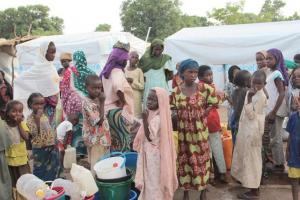UN, European officials concerned at deliberate attacks on civilians in Central African Republic
The United Nations and European Commission emergency relief coordinators expressed deep concern over reports of alarming levels of violence in the Central African Republic (CAR), including several cases in which armed groups deliberately targeted camps sheltering displaced people.

Central African Republic children in Chad.
“These attacks are intolerable violations of international law and the perpetrators must be held accountable,” UN Under-Secretary-General for Humanitarian Affairs Valerie Amos and European Union Commissioner for International Cooperation, Humanitarian Aid and Crisis Response Kristalina Georgieva urged in a joint statement.
“We call on all parties to the conflict, and on those who may have influence over them, to end attacks on civilians, schools, hospitals, religious sites and humanitarian aid workers,” they said.
According to the statement, armed groups attacked a religious site hosting 10,000 displaced people in Bambari on 7 July, killing at least 26 people and injuring 35. This followed weeks of escalating violence in and around Bambari. Hospitals in the area were overwhelmed with people who need treatment for gunshot and machete wounds.
Some 2.5 million Central Africans need assistance. More than half a million people, mainly women and children, have fled their homes and are living in temporary shelters, sometimes deep in the forest or in sites where they are at risk of attack. Waves of hungry, sick and exhausted refugees and returnees are arriving in neighbouring countries, putting a strain on host communities and creating a regional crisis.
“Central Africans are surviving without the most vital necessities including food, medicines and clean water, and many are living in fear for their lives. We must stand with them and show them they are not alone,” the joint statement said.
Ms. Amos and Ms. Georgieva called on the EU and UN Member States to step up their efforts, both on the security side and by finding new funding streams for humanitarian operations inside CAR and in neighbouring countries.
While international forces led by the African Union and EU are playing an indispensable role in protecting civilians, insecurity persists and hinders the deployment of humanitarian aid workers.
Source: UN News
- 374 reads
Human Rights
Ringing FOWPAL’s Peace Bell for the World:Nobel Peace Prize Laureates’ Visions and Actions

Protecting the World’s Cultural Diversity for a Sustainable Future

The Peace Bell Resonates at the 27th Eurasian Economic Summit

Declaration of World Day of the Power of Hope Endorsed by People in 158 Nations

Puppet Show I International Friendship Day 2020

